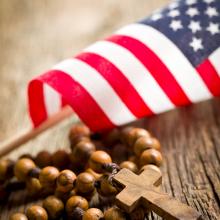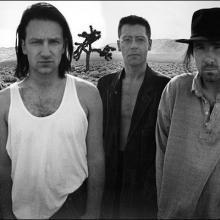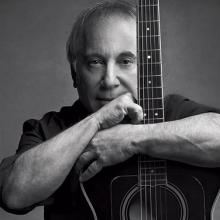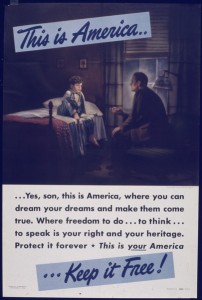spiritual
The sanctuary, designed by Newman Architects of New Haven, Conn., provides a space for sharing, a place for those from different faith traditions, values, and cultures to meet and engage in dialogue, and to nurture the Lynn University community.

Image via Yulia Grigoryeva/Shutterstock.com
Summer’s gone, and with it the breezier reading of the beach and the hammock. In its place comes a more serious reading list — more literary, less lightweight. Here are seven books where religion plays a role — though not a proselytizing or a self-help one — to read between the falling leaves.

Image via Art_Photo/Shutterstock.com
Rather than something that must be hidden, brokenness becomes a uniting essence. As different as we are, woundedness becomes the very catalyst for transformation, allowing the ladders of hierarchy and walls of division to naturally begin to decay into the common ground of suffering — a suffering that can, and will be, the very site of new life.

Image via KANIN.studio/Shutterstock.com
“Down by the Riverside” comes out of the same time in the history of our nation that the lingering divisions of Civil War did, and it’s a reminder to us that our hope and calling as children of God is to leave off studying war.
I believe that a Christian can nonetheless honor those who have fallen in war. They are casualties not only of the arms of a foe, but also of the failure of humanity to build a better peace. Those who hold arms take on not only the burden of risking their lives, but are also made to bear those first poisoned fruits whenever nations or radical groups turn to the sword instead of the plowshare.
If you’ve been reading our blog or have checked your iTunes last week you’ve noticed the power couple of Steve Jobs’ ghost and Bono working together again. (Anyone rememberthe U2 iPod?) I’ll leave it up to music critics to debate the musical quality of the album and the potential violation of the now infamous iCloud downloading music for each Apple user. But there is one other issue to discuss regarding the U2’s recent release: God.
In a recent article published by The New Yorker, author Joshua Rothman takes an in-depth look into the spirituality of what some would call the world’s most popular rock band. Throughout the years, Bono’s religious roots have not been a secret. Books such as Get Up Off Your Knees: Preaching the U2 Catalog and We Get to Carry Each Other: The Gospel according to U2 have been published within the last decade. The Archbishop of Canterbury has addressed Bono in lectures and Bono has preached at the National Prayer Breakfast.
One of the most interesting aspects of Rothman’s article was the citing of “churches around the world celebrating U2charists.” Churches as far as the Netherlands, Austria, Mexico, and as close as Iowa, Baltimore, and Maine have celebrated U2charists, a communion service accompanied by U2 songs in lieu of traditional hymns. Rev. Paige Blair, of St. George’s Episcopal Church of Maine, was one of the first religious leaders to host such a service. According to Rev. Blair:
“the liturgy itself is pretty traditional — it has all the usual required elements: a Gospel reading, prayers, and communion from an authorized prayer book. The music is really what is different. And yet, not so different. It is rock 'n roll, but it is also deeply and overtly spiritual.”
When you truly experience the love of God, there is nothing you won’t do for God. When you are truly thankful for salvation, no place is off limits to share the gospel. When you read Matthew 25, you are willing to dwell in any environment to be the hands and feet of Jesus. Our compassion compels us to love without conditions and work beyond the hours of Sunday morning.
We see the necessities of the people, so we respond with passion and purpose. However, we often push ourselves beyond measure and forget to allow God to nurture and nourish our own souls, so that we are able to pour out into others.
It’s become a disturbing trend among Christians to lament the downfall of our nation’s “Christian identity” — to judge and criticize the spiritual downfall of the current generation. They boast about the glorious past and predict an apocalyptic demise for the future — brought on by the secularization and ethical demise of our society.
This attitude is based around a sense of fear, judgment, cynicism, fatalism, and hopelessness.
Many Christians today use the term “post-Christian” to describe the United States in conjunction with their assumptions that our nation is falling deeper and deeper into a moral decline, but this word presupposes that we were Christian to begin with. We weren’t.
There are lots of biases and assumptions about Christians out there, many of which are founded in real-life experience. And yes, we Christians have done our share of damage when it comes to tarnishing our so-called “brand.” But there also seems to be this tendency to understand Christianity and its adherents as one generally monolithic group that can be described in simple (often negative) terms that they would never be acceptable to apply to any other group.
Part of this is because of the historic dominance of the Christian culture in the modern Western world. It’s the same reason that stereotypes of men on network sitcoms are pervasively unflattering, while the same stereotypes would cause a firestorm of negative publicity if applied to the female counterparts. Some of this is entirely warranted and necessary in tearing down false or damaging constructs of power. But sometimes, if we’re being honest, they’re just wrong. And stupid.
WHEN I FIRST started attending the Church of the Apostles in Fairfax, Va., we had no church building and met in the cafeteria of an elementary school. There were about 50 of us and a brand new priest, Rev. H. Lawrence Scott (“Call me Renny”). It was an Episcopal church in Fairfax County in the 1970s. Really, how much trouble could I get into?
What I didn’t know was that it was a charismatic, Bible-believing, tongues-speaking church. The praise band led us in worship. We sang and raised our hands. There was speaking in tongues and interpretation.
When I committed my life to Jesus in October 1977, I was sitting in the living room with Renny and his wife, Margaret. We had lunch. We talked. I disagreed with them about this Jesus stuff. We talked some more, and I was shocked to find myself saying “yes” when Renny asked if I was ready to commit my life to Jesus. I just said sure—then Renny made me pray. I remember walking to the car and having a brief conversation with God, the culmination of which was that I said I would never be a missionary to Africa. It’s funny what I thought were the key questions then.
Because I am an all-or-nothing person, I threw myself entirely into this new life. Within a few weeks I was baptized in the Spirit. I went to a Bible study every week. When I heard you were supposed to have a quiet time, I did that religiously. Every morning I sat and waited on God: Bible reading and prayer, other spiritual reading, and index cards to help me remember. Every morning for years I got up very early and met with Jesus in the quiet before dawn. Between my study and the praise songs we sang at church, I learned hundreds of scriptures by heart.
THERE IS STILL a political definition of “Christian” out there that is depressingly familiar: the right-wing voting, Fox News-sourced agitprop spewer who uses Jesus to shoehorn others into something the actual Lord of the universe could care less about. Lillian Daniel is not going to take this definition anymore, but she’s not mad as hell. She’s winsome as heaven. Her humor clears the way for her preaching to hit home, and her love for the church, both her congregation and universal, anchors this work. Give it out to your friends and to strangers on the street.
First, Daniel’s humor: It is hard to give examples of her humor without them falling flat. She’s at her droll best when the reader’s defenses aren’t up. This isn’t the humor of the warm-up act before the preacher gets on to something serious—she often drives her meatiest points home with her funniest stuff. For example, a running motif in the book is the airplane companion who thinks he’s being edgy when he says to the pastor beside him that he sees God in rainbows and sunsets. This “spiritual but not religious” mindset is now the bland norm in America, not some spectacular new revelation: “They are far too busy being original to discover that they are not.”
Some of Daniel’s most withering observations are reserved for the mainline church she loves: the sneering religious critic is told “all those questions actually make him a very good mainline Protestant.” The self-congratulatory short-term missionary who comes home convinced how “lucky” she is to live in America receives this barb: “When generosity begets stupidity it wasn’t really generosity to begin with.”
In the fourth chapter of John’s Gospel Jesus speaks with a woman when they find themselves alone at a well at midday. We can learn a lot from what he says to her, and from what he chooses not to say.
Jesus tells the woman, “Go, get your husband, and bring him here.” She replies, “I have no husband.” Jesus tells her “That’s right. You’ve had five husbands, and the man you’re now with isn’t your husband.”
These could have been shaming words. In her culture, to be without a husband is to risk economic ruin, and to have been divorced by your husband is to be shamed.
Had he wanted to, Jesus could have scored some serious points here: I’m a prophet, and you’re a sinner. I’m celibate, and you’re promiscuous. You are living in sin by living with a man who is not your husband.
Evidently, he didn’t want to say those things.
The only reason that I am Christian is because I am spiritual-but-not-religious.
Right. That's it.
Let me first say that in my own thinking, I don't separate these two things, religion and spirituality. I get that many do and I can see the rhetorical advantages to doing so. I just don't do so for any other reason than popular conversation has done so.
Here's why, and please forgive the autobiographical nature of this post. It's a testimony of sorts and dreadfully difficult to summarize. I'm pretty well convinced that I'm not all that unique in what I'm about to share. Also, if you have been paying attention (assuming you've known me for some time or been reading my blog) none of this should come as a surprise.
The only reason that I am Christian is because I am spiritual-but-not-religious.
TORONTO — The Canadian government is canceling the contracts of all non-Christian chaplains at federal prisons.
By next spring, Muslim, Jewish, Sikh and other non-Christian inmates will be expected to turn to Christian prison chaplains for religious counsel and guidance.
In an email to reporters on Oct. 4, the office of Public Safety Minister Vic Toews, who is responsible for Canada's federal penitentiaries, said the government "strongly supports the freedom of religion for all Canadians, including prisoners."
THE MOTTO OF RADICAL FAITH always is “now—or never.” If we can’t find divine grace reaching out to us in the here and now, just where we are, then we will never find it. We won’t find it by merely dwelling on the stories and legends of divine interventions in the past. For centuries, the fourth gospel has made people uneasy because it heightens the tension between those who think of religion as loyalty to what has been handed down for us to repeat and those who are prepared to see God right before them and with them now. This month we are asked to immerse ourselves in the very tense sixth chapter of John’s gospel, in which Jesus provokes bafflement and resentment by daring to appropriate to himself the mystique of the manna, the bread from heaven given by God to sustain the Israelites on their journey through the wilderness.
Everyone knew what the bread from heaven was. It was something miraculous embedded in legends of yesteryear, wasn’t it? Quite apart from being scandalized by Jesus’ apparent delusional egomania, the people are unsettled by the way he wrests the whole theme of being fed by God from its safe mummification in legend and miracle, and plants it in the immediate here and now. He forces the question about whether we dare acknowledge our own pangs of hunger for the eternal, and whether we are prepared to receive—eat and drink—the living person of Christ as the gift that will satisfy that hunger.
Matthew Hutson asks an interesting question in an article for The Huffington Post - Are Conservatives More Religious and Liberals More Spiritual?
"In the United States, religion and politics have always been (fitful) bed buddies. But whether faith drives people left or right (or neither) is not obvious. On one hand, there is the Christian right, a demographic epitomized by Jerry Falwell and Pat Robertson that values tradition and authority and opposes gay rights and the teaching of evolution. On the other hand, we owe many of our advancements in civil rights -- a predominantly left-wing cause -- to religious leaders such as Martin Luther King Jr. One way to make sense of the relationship between faith and political orientation is to recognize the difference between religiousness and spirituality."
Read the full piece here
Choose carefully those with whom you surround yourself. Pay attention to that which you pursue with all your heart, all your soul and all your might -- and to what compromises you are willing to make in that pursuit. Make those compromises judiciously and with reflection, because when they all add up, you may realize that you’ve become someone you don’t recognize.
Who you will become is determined in large part not by what you acquire, but by what you give -- and how you give of yourself.
Desert sky
Dream beneath the desert sky
The rivers run, but soon run dry
We need new dreams tonight
~ from "In God's Country" by U2
On March 9, 1987, U2 released The Joshua Tree, its fifth studio album and one that would catapult the Irish rock quartet from popularity to international superstardom.
Twenty-five years later, today The Joshua Tree is one of the most bestselling albums in history — with more than 25 million copies sold — and is considered to be among the best rock albums of all time.
Its spiritual and socio-political heft has, for me at least, only grown more powerful over the years. As I listened to it again today, the soul-shaking music and lyrics sounded even fresher in our current nervous times than they did to my teenage ears in the twilight of the Reagan era.
"How was all of this created? If the answer to that question is God created everything, there was a creator, than I say, great! What a great job. And I like the idea. I find it very, I don’t know, I find it comforting in some way. But if the answer to that is there is no God, I don’t feel like, well, what a jerk I’ve been. I feel, oh fine, so there’s another answer. I don’t know the answer. I’m just a speck of dust here for a nanosecond, and I’m very grateful." — Paul Simon in an interview that will air this weekend on the PBS program Religion & Ethics Newsweekly.
Watch the interview in its entirety inside ...
Nearly 50 million Americans are currently living below the poverty line (that is $22,000 for a household of four) and half of them are working full time jobs.
In our current economic system, the "happiness" of the super-elite is secured while the lives, liberty, and access to basic needs of the rest suffer. This isn't the American Dream and it isn't God's dream either.












